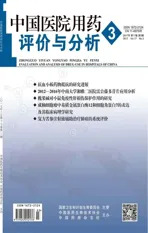抗血小板药物抵抗的研究进展Δ
2017-04-11李新刚赵志刚孙树森
李新刚,凌 曦,赵 坤,马 宁,赵志刚,孙树森
(1.首都医科大学附属北京天坛医院药学部,北京100050; 2.首都医科大学附属北京天坛医院急诊介入科,北京 100050; 3.西新英格兰大学药学院,马萨诸塞州 斯普林菲尔德 01119,美国)
·本期特稿·
抗血小板药物抵抗的研究进展Δ
李新刚1*,凌 曦1,赵 坤1,马 宁2,赵志刚1,孙树森3#
(1.首都医科大学附属北京天坛医院药学部,北京100050; 2.首都医科大学附属北京天坛医院急诊介入科,北京 100050; 3.西新英格兰大学药学院,马萨诸塞州 斯普林菲尔德 01119,美国)
目的:抗血小板药物(阿司匹林、氯吡格雷)抵抗是神经介入术后缺血事件再发的重要因素,本文旨在探讨可能导致药物抵抗的风险基因和位点。方法:以神经介入常用的抗血小板药物阿司匹林和氯吡格雷为研究对象,对遗传因素导致的阿司匹林抵抗和氯吡格雷抵抗相关研究进行了整理。结果与结论:阿司匹林抵抗的研究结果间存在争议,目前没有公认的基因位点变异与阿司匹林抵抗相关;CYP2C19弱代谢是氯吡格雷抵抗的重要因素,但CYP2C19仅能解释约12%的药物抵抗,因此临床并不推荐常规进行该基因的检测,氯吡格雷抵抗的主要因素仍在研究当中。此外,当前的研究多集中于心血管病患者,在脑血管病患者中药物抵抗的研究有待加强。
阿司匹林; 氯吡格雷; 药物抵抗; 基因变异; CYP2C19
脑血管病已成为我国居民首位死亡原因,且以缺血性脑血管病为主。神经介入作为治疗缺血性脑血管病的一种重要手段,能够显著地降低疾病的致残、病死及卒中复发率。抗血小板药物治疗是保证介入治疗安全性和有效性的基础[1],但患者间存在较大的个体差异,部分患者尽管规律服用抗血小板药物,仍不能避免缺血事件的发生,这些患者对抗血小板药物的反应性较低,称之为抗血小板药物抵抗[2-3]。遗传变异是药物产生抵抗的重要因素[4],本文以神经介入常用的抗血小板药物阿司匹林和氯吡格雷为研究对象,对可能导致药物抵抗的风险基因和位点进行了整理,以期帮助临床早发现、早诊断、早干预,减少药物抵抗患者术后缺血事件的再发率。
1 阿司匹林抵抗
目前对阿司匹林是否存在抵抗仍然存在争议。2013年《Circulation》杂志在线发表了一项药学人员开展的研究,将血小板聚集率下降>60%定义为有反应(即不存在阿司匹林抵抗),结果显示,阿司匹林抵抗并不存在;相反,因药物吸收延迟和减少而导致的“假抵抗”现象在受试者服用肠溶阿司匹林后很常见,长期给药(连续服用7 d)并未发现真正的阿司匹林抵抗[5]。现有的各种体外血小板功能检测能否正确反映个体血小板的反应性[6-7]、能否预测临床终点事件,有待证实。常规检测血小板功能的临床意义有限,所以,不能简单通过一项血小板聚集率就判定患者是否存在抵抗。规律服药前提下是否有临床缺血事件的发生,是本研究更为关注的内容。对目前报道的阿司匹林抵抗相关文献进行整理汇总,结果显示,目前仍未有公认的基因位点变异与阿司匹林抵抗相关,见表1。
注:PCI为经皮冠状动脉介入治疗;“—”表示无相关信息;*参考文献列为文献的PubMed唯一标识码
Note:PCI is the percutaneous coronary interventions;“—”indicates not available;*refer to the PubMed identifier(PMID)
2 氯吡格雷抵抗
对当前关于氯吡格雷抵抗的研究进行了整理,结果见表2。由表2可见,CYP2C19*2(rs4244285)*3(rs4986893)和*17(rs12248560)3个位点的变异与氯吡格雷治疗效果具有明显的相关性,而对其他基因的其他位点的研究仍未得到一致的结论。CYP2C19*2位点的变异产生了剪接缺陷,导致酶的活性缺失[8];而CYP2C19*3位点的变异生成了一个终止密码子,导致基因表达为一段无活性的多肽[9];CYP2C19*17位点位于基因的启动子区域,变异大幅增加了基因的转录从而使酶表达量显著增加[10]。美国食品药品监督管理局、欧盟药品管理局、日本医药品及医疗器械综机构和加拿大卫生部等药政部门批准的氯吡格雷药品说明书中均指出,对于CYP2C19弱代谢患者,服用氯吡格雷会增加缺血事件的发生风险,建议改变治疗策略。同时服用CYP2C19抑制剂(如奥美拉唑)时也会增加缺血事件的发生风险。美国临床药物基因组学实施联盟[11]和荷兰药物基因组联盟[12]发布的氯吡格雷用药指南中也明确指出了CYP2C19在氯吡格雷活化中的重要作用,但并没有推荐临床常规对CYP2C19进行检测,主要是由于CYP2C19基因变异对氯吡格雷抵抗的形成作用有限。一项全基因组关联分析研究结果显示,CYP2C19基因变异仅能解释约12%的氯吡格雷抵抗,高龄、高脂血症、肥胖等因素仅能解释不到10%的氯吡格雷低反应[13]。亦有研究结果表明,氯吡格雷吸收相关基因ABCB1[14]和作用靶点P2Y12基因[15]的启动子甲基化差异与氯吡格低反应可能存在相关性,但纳入的病例较少,且未能与临床事件相结合,该结果仍需要大样本的临床研究证实。综合上述,目前对产生氯吡格雷抵抗的主要原因仍不清楚。
综上所述,阿司匹林是否存在抵抗仍然存在争议,从当前的证据来看,没有公认的基因位点变异与阿司匹林抵抗相关;氯吡格雷抵抗客观存在,临床研究和指南均支持CYP2C19弱代谢与氯吡格雷抵抗有关,同时,应避免与CYP2C19抑制剂联合应用,但CYP2C19的作用有限,并不推荐临床常规进行CYP2C19基因型检测。此外,当前的研究对象多集中于心血管病患者,对脑血管病患者的相关研究极少。心血管和脑血管之间存在较大差异,心血管病患者的研究结果是否能够外推到脑血管病患者中,仍有待于进一步确证。
[1]Wong KS,Chen C,Fu J,et al.Clopidogrel plus aspirin versus aspirin alone for reducing embolisation in patients with acute symptomatic cerebral or carotid artery stenosis(CLAIR study):a randomised,open-label,blinded-endpoint trial[J].Lancet Neurol,2010,9(5):489-497.
[2]Wiviott SD,Antman EM.Clopidogrel resistance:a new chapter in a fast-moving story[J].Circulation,2004,109(25):3064-3067.
[3]Nguyen TA,Diodati JG,Pharand C.Resistance to clopidogrel:a review of the evidence[J].JAmCollCardiol,2005,45(8):1157-1164.
[4]Frelinger AL3rd,Bhatt DL,Lee RD,et al.Clopidogrel pharma-cokinetics and pharmacodynamics vary widely despite exclusion or control of polymorphisms(CYP2C19,ABCB1,PON1),noncomp-liance,diet,smoking,co-medications(including proton pump inhibitors),and pre-existent variability in platelet function[J].JAmCollCardiol,2013,61(8):872-879.

表2 基因变异与氯吡格雷抵抗相关性研究汇总
注:PCI为经皮冠状动脉介入治疗;“—”表示无相关信息;*rs12248560即CYP2C19*17位点,该位点突变会导致CYP2C19基因的高表达,代谢酶的活性增加使患者的出血风险增加;#参考文献列为文献的PubMed唯一标识码
Note:PCI is the percutaneous coronary interventions;“—”indicates not available;*CYP2C19*17(rs12248560)results in increased CYP2C19 expression, activity and bleeding risk;#refer to the PubMed identifier(PMID)[5]Grosser T,Fries S,Lawson JA,et al.Drug resistance and pseudoresistance:an unintended consequence of enteric coating aspirin[J].Circulation,2013,127(3):377-385.
[6]Lv HH,Wu S,Liu X,et al.Comparison of VerifyNow P2Y12 and thrombelastography for assessing clopidogrel response in stroke patients in China[J].Neurol Sci,2016,37(2):277-282.
[7]Guan J,Cong Y,Ren J,et al.Comparison between a new platelet count drop method PL-11,light transmission aggregometry,VerifyNow aspirin system and thromboelastography for monitoring short-term aspirin effects in healthyindividuals[J].Platelets,2015,26(1):25-30.
[8]de Morais SM,Wilkinson GR,Blaisdell J,et al.The major genetic defect responsible for the polymorphism of S-mephenytoin metabolism in humans[J].J Biol Chem,1994,269(22):15419-15422.
[9]Fukushima-Uesaka H,Saito Y,Maekawa K,et al.Genetic variations and haplotypes of CYP2C19 in a Japanese population[J].Drug Metab Pharmacokinet,2005,20(4):300-307.
[10] Sibbing D,Koch W,Gebhard D,et al.Cytochrome 2C19*17 allelic variant,platelet aggregation,bleedingevents,and stent thrombosis in clopidogrel-treated patients with coronary stent placement[J].Circulation,2010,121(4):512-518.
[11] Scott SA,Sangkuhl K,Stein CM,et al.Clinical Pharmacogenetics Implementation Consortium guidelines for CYP2C19 genotype and clopidogrel therapy:2013 update[J].Clin Pharmacol Ther,2013,94(3):317-323.
[12] Swen JJ,Nijenhuis M,de Boer A,et al.Pharmacogenetics:from bench to byte—an update of guidelines[J].Clin Pharmacol Ther,2011,89(5):662-673.
[13] Shuldiner AR,O’Connell JR,Bliden KP,et al.Association of cytochrome P450 2C19 genotype with the antiplatelet effect and clinical efficacy of clopidogrel therapy[J].JAMA,2009,302(8):849-857.
[14] Yang J,Zhou JS,Zhao YX,et al.ABCB1 hypomethylation is associated with decreased antiplatelet effects of clopidogrel in Chinese ischemic stroke patients[J].Pharmazie,2015,70(2):97-102.
[15] Su J,Li X,Yu Q,et al.Association of P2Y12 gene promoter DNA methylation with the risk of clopidogrel resistance in coronary artery disease patients[J].Biomed Res Int,2014:450814.doi: 10.1155/2014/450814.
Research Progress of Antiplatelet Drug ResistanceΔ
LI Xingang1, LING Xi1, ZHAO Kun1, MA Ning2, ZHAO Zhigang1, SUN Shusen3
(1.Dept.of Pharmacy, Beijing Tiantan Hospital, Capital Medical University, Beijing 100050, China; 2.Dept.of Emergency Intervention, Beijing Tiantan Hospital, Capital Medical University, Beijing 100050, China; 3.College of Pharmacy, Western New England University, Springfield, MA 01119, United States)
OBJECTIVE:Antiplatelet drugs(aspirin, clopidogrel) resistance is an important factor in the recurrence of ischemic events after neurosurgical interventions. This article aims to probe into the genetic risks and locus which may cause drug resistance. METHODS: The frequently-used antiplatelet drugs in the neurosurgical intervention, aspirin and clopidogrel were set as study objects. Correlational studies on aspirin and clopidogrel resistance caused by genetic factors were settled. RESULTS&CONCLUSIONS:Result of aspirin resistance remained controversial, and there was no recognized genetic locus variation associated with aspirin resistance. The poor metabolism of CYP2C19 was an important factor of clopidogrel resistance, yet CYP2C19 can only explain about 12% of the drug resistance. Therefore, routine testing of CYP2C19 genetic polymorphism was not recommended in clinical practice. Researches on factors leading to clopidogrel resistance are still in active. In addition, current studies mainly focus on patients with cardiovascular diseases, therefore, researches on drugs resistance of patients with cerebrovascular diseases need to be reinforced.
Aspirin; Clopidogrel; Drug resistance; Genetic variant; CYP2C19
国家自然科学基金青年项目(No.81503157)
R973
A
1672-2124(2017)03-0289-04
2017-02-14)
*副主任药师。研究方向:精准用药。E-mail:lxg198320022003@163.com
#通信作者:教授。研究方向:临床药学。E-mail:ssun@wne.edu
DOI 10.14009/j.issn.1672-2124.2017.03.001
